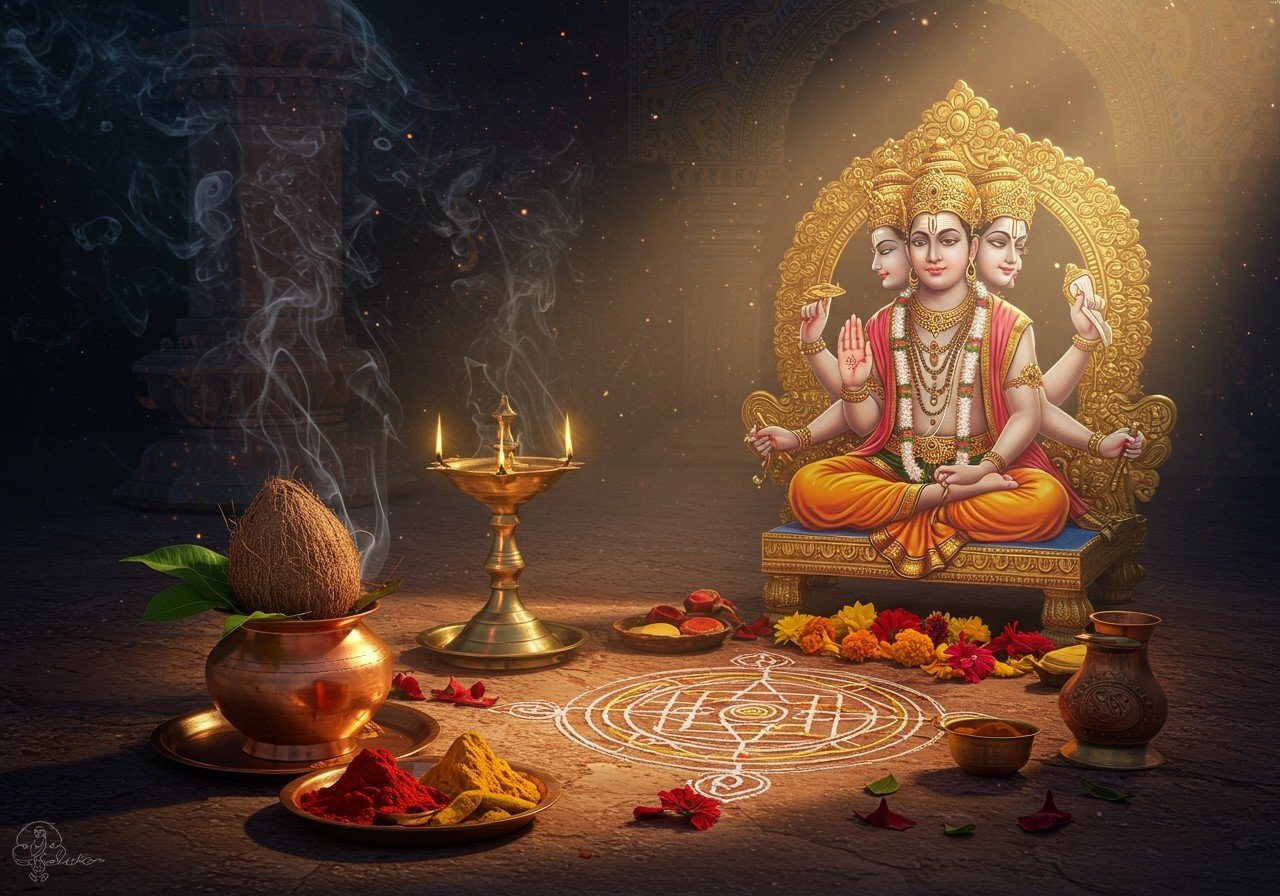
Sri Pada Srivallabha, revered as an incarnation of Lord Dattatreya, holds a special place in the hearts of his devotees. This guide explores the daily rituals and observances essential for honoring Sri Pada Srivallabha. Understanding these practices not only strengthens spiritual connections but also enriches daily life. Key rituals include recitations like the Sripada Srivallabha Stotram and Ashtottara Shatanamavali, vital for a devoted spiritual practice. You can find a variety of items for your puja needs at poojn.in.
Understanding Sri Pada Srivallabha
Sri Pada Srivallabha is the first avatar of Lord Dattatreya. His teachings, originating from his birthplace in Pithapuram, hold significant historical and spiritual importance, impacting the lives of devotees. The stories of his divine leelas inspire followers on a path of righteousness and devotion, leaving a lasting legacy of reverence within the spiritual community.
Daily Puja for Sri Pada Srivallabha
Performing daily puja for Sri Pada Srivallabha involves dedicated practices that foster peace and spiritual growth. Each step helps connect with divine energy and cultivates a life of devotion. Consider enhancing your puja experience with authentic products from Poojn.in.
Preparation for the Puja
Begin with purity. A bath and fresh attire set the tone for devotion. Ensure your puja area is clean and sanctified by sprinkling Ganga jal. Prepare your altar with idols or pictures of deities you worship, including Sri Pada Srivallabha. Saibaba or Dattatreya images can be substituted if a picture of Sri Pada Srivallabha is unavailable. Assemble a puja thali with essential items: kumkum, haldi, chandan, flowers, incense sticks, a diya, and naivedya. Keep your mantra book at hand.
Poojn.in offers a wide selection of high-quality puja items to help you prepare for your daily rituals. From pure copper kalash and panchapatri to traditional cotton wicks and pure ghee, we provide everything you need to create a sacred space for your worship.
Basic Puja Steps (Upacharas)
Invoke the deity’s presence with heartfelt mantras, inviting them into your home and heart. Then, proceed with the offerings (Upacharas):
- Asana: Respectfully offer a seat to the deity. This symbolizes welcoming the divine presence into your home.
- Padya: Offer water to wash the deity’s feet. This act signifies humility and reverence.
- Arghya: Offer water to wash the deity’s hands. This shows respect and acknowledges their divine power.
- Achamaniya: Offer water for sipping, representing purification and inner cleansing.
- Snana: Symbolically bathe the deity with water, signifying purification and renewal.
- Vastra: Offer clothes or a piece of cloth, demonstrating care and devotion.
- Yajnopavita: Offer the sacred thread, a symbol of spiritual connection.
- Gandha: Apply sandalwood paste, representing fragrance and purity, to the deity.
- Pushpa: Offer flowers, chanting known names of the Divine form. Flowers symbolize beauty and devotion.
- Dhoopa: Light incense sticks and offer the fragrance. This purifies the atmosphere and pleases the deity.
- Deepa: Light a ghee or oil lamp, symbolizing the illumination of knowledge and dispelling darkness.
- Naivedya: Offer food, fruits, and sweets, sharing the fruits of your labor with the divine.
- Tambula: Offer betel leaves and nuts, a traditional mark of respect and completion.
- Aarti: Perform aarti by waving the lamp in a circular motion while singing a devotional song, a vibrant expression of devotion.
Poojn.in offers a range of decorative items and puja essentials to enhance your worship experience. You can find everything you need for the Upacharas, from beautiful thalis to fragrant incense sticks.
Mantras and Chanting Practices
Commence with a prayer to Lord Ganesha to remove obstacles. Recite “Digambara Digambara Sri Padavallabha Digambara” as your primary mantra. Incorporate other powerful mantras: “Datta Digambarā! Srīpādavallabha Digambarā! Narasimha Saraswati Digambarā!”, “Srīpāda Rājam Saranam Prapadye!”, and “Om Namo Bhagavate Vasudevaya.” Utilize a japa mala with 108 beads to count your chants, reciting the mantra 108 times with focused intention on the meaning and sound. For added blessings, recite the Siddha Mangala Stotram daily. Find a peaceful space and allow the mantras to resonate within you.
Other Important Practices
Perform Sankalpam, stating your purpose for the puja and seeking divine blessings. Practice Pradakshina, circumambulating the deity three times while chanting. Show reverence through prostration, touching your forehead to the ground. Deepen your understanding by reading scriptures like “Sri Gurucharitra” and “Sri Srīpāda Srivallabha Charitamrutam.” Engage in Namajapa, repeating the divine name “Digambara Digambara Sri Padavallabha Digambara.” You can find a selection of holy books at Poojn.in to support your spiritual practice.
Concluding the Puja
Conclude the puja by acknowledging any unintentional errors and expressing sincere gratitude for the divine presence. Perform the puja with utmost sincerity, faith, and devotion. Adapt the rituals to suit your available time and resources, remembering that even a simple offering made with love holds great significance. Auspicious days to start parayana include Thursdays, Chitra Nakshatram days, Pournima, and Ekadasi. While not mandatory, some devotees abstain from non-vegetarian food during parayana. Suitable naivedyam offerings include sugar, milk, jaggery, fruit, or dry fruits. These practices enrich your spiritual connection and draw you closer to Sri Pada Srivallabha’s divine grace.
Frequently Asked Questions About Daily Rituals and Observances for Sri Pada Srivallabha Devotees
What is the best time to chant the Sripada Srivallabha Stotram? The ideal time is early morning, preferably during Brahma Muhurta (two hours before sunrise), known for its spiritual potency.
How often should devotees recite the Sripada Srivallabha Ashtottara Shatanamavali? Daily recitation is beneficial, especially on Thursdays, a day dedicated to gurus and saints.
What is needed for Sripada Srivallabha Aarti? A diya (lamp), incense sticks, flowers, a bell, and optionally, fruits or sweets.
Can these rituals be performed at home? Absolutely, creating a clean, peaceful, and focused environment is key.
Why is Thursday significant? Thursday is traditionally associated with gurus, honoring Sri Pada Srivallabha’s divine guru status.
What if I miss a day of practice? Simply resume the next day. Consistency is good, but devotion and intention are paramount.
Is fasting necessary? Fasting is not required but is practiced by some devotees, especially on Thursdays, within their health limitations. If you are interested in incorporating fasting into your practice, you can find suitable clothing and other items at Poojn.in to support your spiritual journey.
How can families participate together? Involve family by assigning simple tasks, fostering shared devotion and stronger bonds.


